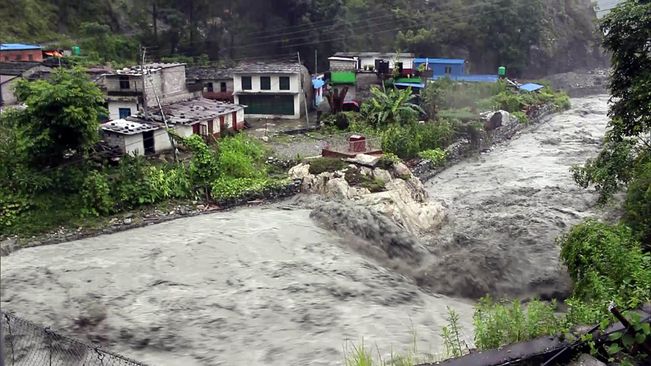The Ministry also confirmed Sunday that 111 individuals have been injured in these calamities, while around 4,000 people have been rescued.
Search, rescue, and relief efforts have been intensified with the deployment of security agencies, The Himalyan Times reported.
Nepali Army helicopters airlifted 162 people who were injured or stranded in parts of Kavre, Sindhuli, and Lalitpur districts.
Relief materials, including food supplies, have been distributed to disaster survivors, and the injured are receiving treatment at government health facilities.
"The government is prioritising search, rescue, and relief efforts with full coordination among all concerned agencies. Blocked roads are being cleared, and reconstruction is underway," Tiwari said.
Provincial governments, district disaster management committees, and local disaster management units are also collaborating in response to the ongoing crises, the Ministry added.
Nepal's hydropower plants and irrigation facilities were badly damaged in floods and landslides triggered by incessant rainfalls in recent days, with an estimated initial loss of 4.35 billion Nepali rupees ($32.6 million).
Addressing a press meeting on Sunday, officials at Nepal's Ministry for Energy, Water Resources and Irrigation said that disasters spelt by continuous rains on Friday and Saturday had caused an estimated loss of 3 billion rupees ($22.5 million) to hydropower and transmission projects, while river control and irrigation projects suffered an estimated loss of 1.35 billion rupees ($10.1 million).
According to the officials, floods had damaged 11 operating hydropower plants with a combined generation capacity of 625.96MW and forced other operating plants to shut down. As a result, 1,100MW in generation capacity was halted, nearly one-third of the total capacity of the country's operating power plants.
Fifteen hydropower plants under construction were damaged as well, it was noted.
As power plants and transmission lines were damaged, power supply in different parts of the country has been disrupted.
"Managing enough power for the country in the upcoming winter could be challenging as it takes time to maintain and repair the damaged power plants," said Kul Man Ghising, managing director of Nepal Electricity Authority.
Nepal produces surplus hydropower during the monsoon season, but in the dry season it generates around one-third of the power.
The Ministry of Physical Infrastructure and Transport said in a statement that 47 of 80 national highways in Nepal had remained obstructed.
(IANS)
read more Calamities News















